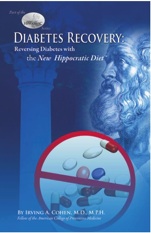Brought to you jointly by The Foundation for Prevention and Dr. Irving A. Cohen
KEY TOPICS AND QUICK LINKS:
To better understand the progression of diabetes:
** Diabetes is a serious disease. This website can not and is not intended to provide individual medical advice. If you are currently using any form of diabetic medication, significant dietary change may necessitate modification or discontinuation of your medication schedule. Consult a qualified medical practitioner for individual direction and medical advice. **
KEY TOPICS AND QUICK LINKS:
How far has your Type 2 Diabetes progressed?
Diabetes has been known went since ancient times but was usually not diagnosed until the later stages. Today, we have many sophisticated methods of judging and evaluating the progress of Type 2 Diabetes, yet we often fail to diagnose this disease in its earliest stages. Type 2 Diabetes is a progressive disease. This is unlike Type 1 Diabetes, which can appear suddenly after damage to the pancreas. Yet, a diagnosis of diabetes is often ignored until there is significant progression of this disease. Recent studies have clearly shown that people who have never been diagnosed with diabetes are at risk for some of the same organ damage as are diabetics, if they already have elevated hemoglobin A1C, the test that reveals their average blood sugar level. Despite that, some physicians fail to look for or inform their patients of diabetes at its earlier stages. The result of this failure is that people may develop heart disease, painful peripheral neuropathy, kidney failure, loss of vision and other problems before they actually receive a diagnosis of diabetes. It is important that people learn that their disease can be determined and reversed at an earlier stage. Instead, avoiding this diagnosis, terms such as prediabetic, borderline diabetes, and metabolic syndrome have come into use.
What would you think if people referred to a woman in the first trimester of pregnancy as pre-pregnant? This should be no different. In reality type 2 diabetes is a continuum, and these terms actually represent early stages of Type 2 Diabetes.
Perhaps you are in these early stages of diabetes or you have not yet been diagnosed. You may be a hidden diabetic, or you may have been called a borderline diabetic or a prediabetic. Your fasting blood sugar level, a routine test, might seem perfectly normal because your body can bring it down to normal overnight, even though your average blood sugar is still too high. In these early stages, the right type of dietary change should return you to health. Inflammation causing damage to blood vessels and organs will usually reverse. This is a perfect time to intervene with dietary change, before further damage is done.
On the other hand, if you have already been diagnosed with Type 2 Diabetes, you may be taking medication, regularly have a hemoglobin A1C test, and use a meter to monitor your sugar level at home. If you are not yet taking insulin injections, there is a good chance that you have insulin resistance, but do not yet have pancreatic insufficiency. At this point you should respond well to the right type of dietary change . With the appropriate medical supervision, you may be able to stop all of your diabetic medications, or at least, greatly reduce your need for medication to control your diabetes.
What if you have been started on insulin? It may mean that you have reached a point where your pancreas can no longer produce sufficient natural insulin to meet the needs of your body. Dietary change may help in your diabetes control, but you still may continue to need medication and medical supervision. Even here, there is hope. Some physicians in the past started their patients on insulin early, while they were still capable of producing enough insulin to meet their needs with proper dietary control. You will need to work with a physician to determine if your body is still capable of producing its own insulin in sufficient amounts. The good news is that majority of Type 2 Diabetics can still produce some insulin.
To better understand the progression of diabetes:
– click here to watch a video on the progression of diabetes.
– or here to get our book Diabetes Recovery to learn how more about this.
Your purchase of books or courses at this website will help fund the Foundation for Prevention in its work.
Thank You.
Thank You.


